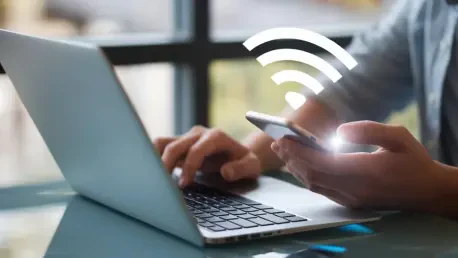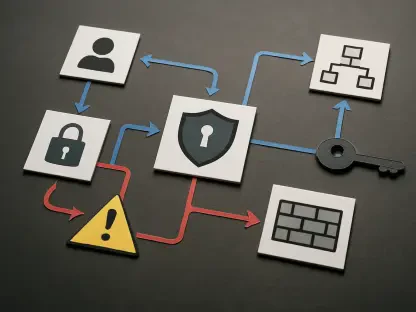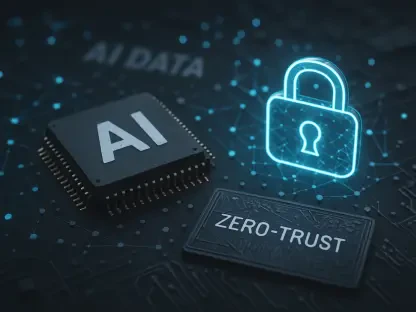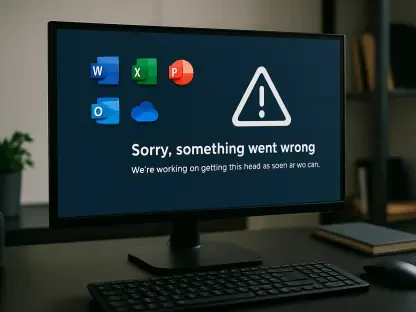In today’s digital age, the convenience of public Wi-Fi networks in places like cafes, airports, and hotels often outweighs the perceived risks. Many individuals, engrossed in their daily digital routines, connect to these networks to check emails, scroll through news feeds, or complete casual online transactions without a second thought. However, the ease and accessibility of these networks come with their dangers. The very nature of public Wi-Fi makes them susceptible to security breaches, which can compromise personal and sensitive data. This raises an important question: Are such networks inherently insecure, and can a Virtual Private Network (VPN) genuinely secure your public Wi-Fi browsing? Considering the startling statistics that show how vulnerable users are on these open networks, understanding the mechanism of VPNs becomes crucial.
1. Mechanisms of VPN Security
Public Wi-Fi networks pose significant security risks primarily due to their open nature, making users susceptible to data interception. When your device connects to open Wi-Fi, your data travels through an unsecured network that can be easily accessed by others nearby. This exposure allows potential eavesdroppers and hackers the opportunity to monitor your online activities, gather sensitive data, and even inject malicious software. In this context, the question arises of how a VPN can effectively protect your data while browsing on public Wi-Fi.
A Virtual Private Network, or VPN, works by creating a secure, encrypted tunnel between your device and a VPN server located elsewhere, through which all your internet activity travels. This is similar to placing your data in a well-protected vault before sending it out, ensuring it remains hidden from prying eyes within the shared network. The data, even if intercepted, is rendered unreadable, offering an additional security layer that springs into action regardless of the encryption employed by the websites or applications you are using. In recent years, the adoption of encryption like HTTPS by most websites has increased, providing more baseline security. However, in situations where this is not available or if you’re operating on a public Wi-Fi network, a VPN acts as a crucial protective layer between your personal data and potential cyber threats.
1. How a VPN Protects Your Wi-Fi Connection
The fundamental function of a VPN is to secure your Internet connection in two main ways: encryption of your data and masking your IP address. Encryption is essential as it ensures that even if a hacker intercepts your Wi-Fi traffic, the data they access remains virtually unreadable. The encryption standard used by leading VPN providers, such as 256-bit AES, is so robust that breaking it would be an insurmountable task for current technology. Therefore, an effective VPN serves as an armored tunnel for your data as it travels from your device to a secure VPN server, shielding it from potential eavesdroppers on the shared public network.
Moreover, VPNs can hide your true IP address, which significantly enhances your online anonymity. Rather than your actual IP address being visible, websites and networks see the IP address of the VPN server. This feature not only serves to conceal your exact location but also makes it much harder for websites to track your online activities. As more and more of our daily activities involve online transactions and communications, the need for secure connections becomes increasingly imperative, making VPNs an invaluable tool for protecting our privacy and data integrity.
The Risks of Public Wi-Fi: Invisible Threats Lurking in Plain Sight
While public Wi-Fi networks provide unparalleled convenience, they are often fraught with security loopholes that promise trouble for unsuspecting users. Open Wi-Fi networks, such as those without a password, are particularly vulnerable to cybercriminal activities. The lack of encryption means that any data you transmit, from personal information to business emails, can be intercepted with ease by individuals sharing the same network. Even networks that require a shared password afford only superficial protection. These so-called secured networks still expose you to potential deciphering of your data if the password is common knowledge or the router is improperly configured.
A survey conducted among users has revealed a staggering 36% who believe public Wi-Fi usage has negligible risk, illustrating a widespread misconception. This false confidence makes these networks prime targets for cyber threats, where hackers can easily intercept communications, maliciously penetrate devices, and extract personal data. As convenience often takes precedence, the risks of public Wi-Fi are overlooked, increasing vulnerability to cyberattacks. The lack of awareness surrounding potential threats associated with open or insecure networks underscores the importance of using a VPN. By cloaking incoming and outgoing traffic, VPNs help mitigate these risks considerably, safeguarding your digital communication and transactions from various malicious attacks.
Understanding Common Threats
While connected to shared public networks, data security can easily be compromised through several common vulnerabilities. One such threat is packet sniffing—an attack where cybercriminals use software designed to intercept and capture data packets as they traverse the network. If a user’s device is connected to an insecure open network and communicating over non-encrypted channels, personal information such as emails, login credentials, and browsing histories become susceptible to being captured by onlookers. Even HTTPS-encrypted sites are not entirely immune, as unauthorized individuals might still identify the websites you visit, though they cannot see all the details of your interactions.
Another nefarious strategy employed by cybercriminals on public networks is the man-in-the-middle (MITM) attack. This type involves a malicious individual intercepting communications between your device and a website. Despite the increased prevalence of encryption protocols like HTTPS to combat cyber threats, MITM attacks remain plausible—particularly when unsuspecting users connect to fake or malicious networks. For this reason, using a VPN is a robust countermeasure against these types of attacks. It ensures that online interactions stay private and immune from tampering by creating a secure, direct connection between your device and remote servers, disguising your IP address, and encrypting incoming and outgoing data.
Exposure Risks on Open Networks
In addition to knowing how a VPN can secure your public Wi-Fi browsing, it is essential to be aware of specific threats you face on these networks. One of the most common threats on open networks is packet sniffing, where individuals capture data packets transmitted over the network using relatively simple software. These intercepted packets can reveal valuable information, such as login credentials, messages, banking details, and browsing activities, to unauthorized users sharing the same Wi-Fi.
Another threat to be aware of on public networks is the notorious man-in-the-middle (MITM) attack. This sophisticated method involves an attacker intercepting communications between your device and a website without your knowledge. Even though secure protocols like HTTPS make this more challenging for hackers to accomplish, it is still possible. The risk of connecting to fake or compromised Wi-Fi networks set up by cyber criminals to deceive users is quite real, and it compromises the confidentiality of your online activities to a great extent. By protecting your data with strong encryption and disguising your IP address, VPNs help keep your online activities safer in public Wi-Fi environments.
Public Wi-Fi hotspots may also be a conduit for malware infections. Cybercriminals often exploit unsecured networks to deliver malicious software to connected devices, potentially leading to significant data breaches. Hackers can lure users into clicking on suspicious pop-up ads or links that secretly install malware on their systems. Upon installation, this malware can steal your files, eavesdrop on your online activities, or recruit your device into larger cyber threats without you even knowing it happened. The best protective measure in these situations is to employ a reliable VPN service when utilizing public networks. By effective encryption of data streams and concealing your device’s details, VPNs make it difficult for malware to gain access or for malevolent parties to monitor your online behavior.
Locking Down Wi-Fi Privacy with a VPN
It is crucial to understand the type of information that can be exposed on public Wi-Fi networks if you do not take proper precautions. Each time you log into an account, such as email, banking, or social media, without the protection of a VPN, you risk exposing your login credentials to those nearby. Once a hacker obtains your password, they can access your accounts, change your credentials, and potentially misappropriate your identity. This highlights the importance of using a VPN when accessing sensitive accounts from public Wi-Fi.
In addition to login credentials, personal files stored on your device or transferred over an unsecured network are vulnerable. Hackers on a public Wi-Fi network can scan for shared folders or intercept file transfers, gaining access to important documents, photos, and other private data. This underscores the importance of encrypting your connection with a VPN. A properly configured VPN can prevent unauthorized access to your files, whether you’re sending information to the cloud or accessing shared resources. The increased security measures ensure that only authorized recipients have access to your communication and transfers, shielding your personal data from prying eyes.
Choosing a Trustworthy VPN Provider
For Internet users who are keen on maintaining privacy on public Wi-Fi networks, selecting a trustworthy VPN provider is paramount. A reliable VPN service should not only offer robust security features such as military-grade 256-bit AES encryption and IP masking but should also adhere to a strict no-log policy. This ensures that your online activities remain private and are not being stored or shared by the VPN provider. The service should have a transparent privacy policy and undergo regular independent audits to confirm its data protection claims, reinforcing trust in its security protocols.
An extensive network of global server locations is another critical component when evaluating a VPN service. A wide selection of servers allows greater flexibility in choosing connections that offer the best speed and sufficient bandwidth. Additionally, this global reach can help bypass regional restrictions on websites and content, especially when traveling. Moreover, cross-device compatibility is essential for providing end-to-end coverage on all internet-enabled devices, from phones to tablets and laptops, with some providers offering solutions as comprehensive as an all-in-one VPN router.
Practical Considerations When Using a VPN
To maximize the effectiveness of a VPN, users need to be mindful of practical aspects such as turning off the auto-connect feature on their devices. Auto-connect can rejoin previously connected networks without any user action, unwittingly exposing sensitive data if a VPN is accidentally deactivated. Adjusting device settings to disable auto-connect ensures control over network connections, providing time to enable VPN protection before accessing risky environments.
Another critical factor to consider when expanding VPN protection across multiple devices is the kill switch if one is provided. A kill switch functions as a safety mechanism that prevents your internet connection from reverting to an unsecured connection if the VPN drops unexpectedly. This feature adds an extra layer of protection by blocking traffic until a secure VPN connection is reestablished. Conversely, to maintain privacy and secure connections, users must remember to activate the VPN before engaging with public Wi-Fi. Choosing a VPN service with user-friendly apps is also advisable, making it easier to remember to switch them on and ensure consistent protection across various devices.
Incorporating a VPN into internet browsing habits should involve a conscientious assessment of when its usage is necessary. Public Wi-Fi networks establish a higher security risk due to potential vulnerabilities and the possibility of third-party surveillance. Consequently, using a VPN on public Wi-Fi networks is necessary to protect personal data and maintain privacy. Moreover, a Wi-Fi VPN proves beneficial even at home, as internet service providers might monitor user activity. Therefore, for those who value their online privacy and want an added layer of protection, consistently using a VPN is a worthwhile measure to protect personal information.
Conclusion
Using a VPN to secure your browsing on public Wi-Fi is crucial, considering the variety of threats present on these networks. Packet sniffing stands out as one of the most frequent dangers, where data packets transmitted over the network are intercepted using straightforward software. Such unauthorized interceptions can uncover sensitive details like login info, messages, bank records, and browsing history, putting your privacy at risk.
Another significant threat is the man-in-the-middle (MITM) attack. Hackers employing this strategy intercept communications between your device and websites, without your knowledge. While HTTPS offers some level of protection, it’s not foolproof. Further risks arise from fake or compromised Wi-Fi networks created by cyber criminals aimed at tricking users, severely jeopardizing the confidentiality of your online activities.
Furthermore, public Wi-Fi hotspots can be breeding grounds for malware infections. Cybercriminals exploit these unsecured networks to spread malicious software, posing a real risk of data breaches. Such malware might be delivered unnoticed, often through deceptive pop-up ads or links, which, upon installation, can steal information or even use your device for larger cyber threats. To combat these risks, utilizing a reliable VPN for encrypting data streams and masking your device details is wise. VPNs obstruct malware access and prevent unauthorized monitoring, thereby enhancing security on public networks.









